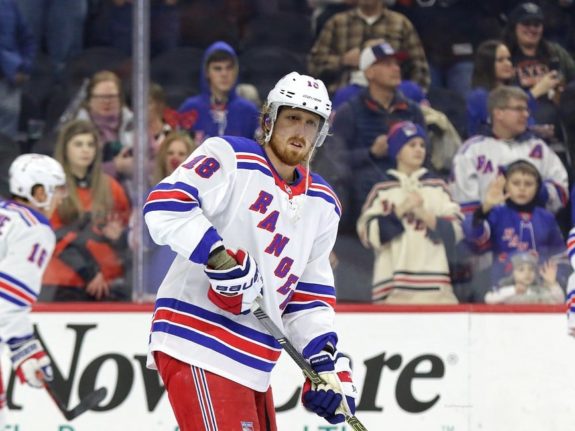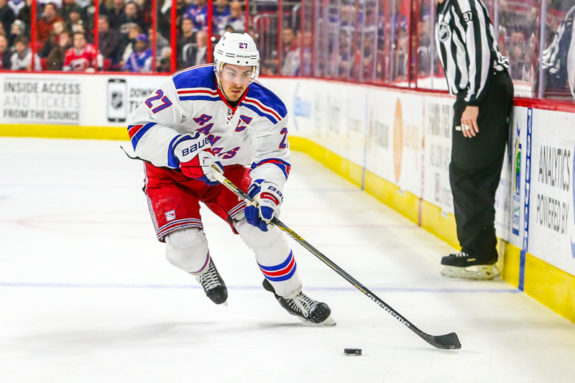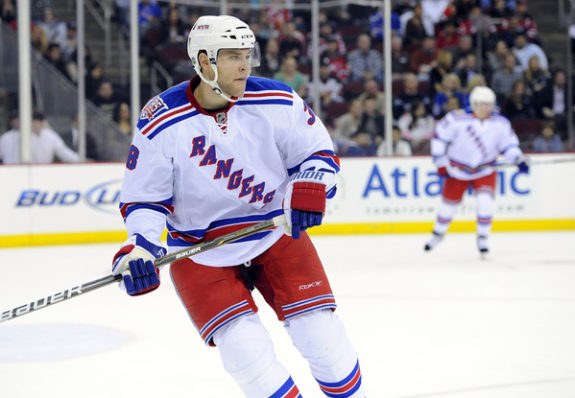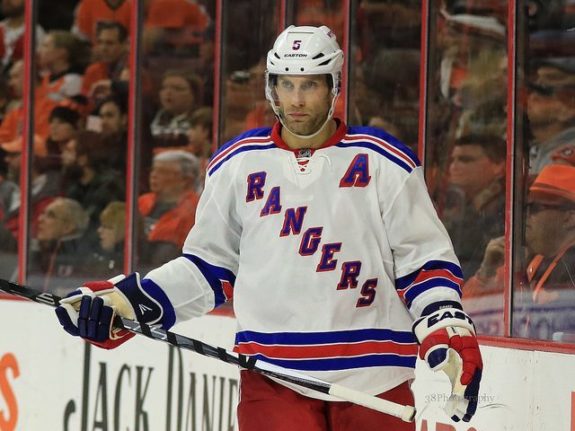The New York Rangers often have talented young defensemen begin their careers in pairs. In the 2007-08 season, it was Dan Girardi and Marc Staal. This season, it’s been Adam Fox and Ryan Lindgren. In the 2010-11 season, it was Ryan McDonagh and Michael Sauer.
The Future Looked Bright for Sauer and the Rangers
Girardi, Staal, McDonagh and Sauer appeared to be a strong group of defensemen that the team could rely on for the foreseeable future. They were all excellent defensively and had the ability to chip in offensively.

Sauer was drafted in the second round in 2005 with a pick the Blueshirts acquired when they traded Brian Leetch to the Toronto Maple Leafs. He had a heavy slapshot but was known as a defensive defenseman. He was listed as 6-foot-3 and 213 pounds but despite his size, he was already a decent skater.
He made his debut for the AHL’s Hartford Wolf Pack in 2007-08 and showed he could be trusted defensively and that he was willing to drop the gloves to stand up for teammates. He finished with four goals and seven assists in 71 games.
Related: What’s in a Name? The NHL’s Original Six
The following season, Sauer improved his skating and became a little more aggressive offensively. He finished with 6 goals and 17 assists in 64 games and made his NHL debut with the Rangers, but was sent back to Hartford after just three games. He failed to play for the Blueshirts during an injury-plagued 2009-10 season but made the opening day lineup for New York in the 2010-11 season.
Sauer’s NHL Career
Sauer’s rookie season was very impressive. He quickly showed he could be trusted to help the team hold off opponents when leading late in games, and on the penalty kill. He also showed he had developed into a very good skater.
He was physical, never passing up a chance to throw a check, and repeatedly using his strength to clear opponents out of the crease. He also fought to stick up for teammates and himself multiple times.
About halfway through the season the Rangers called up McDonagh and paired him with Sauer. The two instantly formed chemistry and became a shutdown defense pair.

While Sauer still focused primarily on his defensive play, he had a strong slapshot and a good feel for when he should pinch in to keep the puck in the offensive zone. He managed to score 3 goals and added 12 assists in 76 games while being a plus-20. By the end of the season, he was playing more than 20 minutes per game even though he never played on the power play. He scored a memorable game-winning goal against the Boston Bruins late in a crucial game for the Rangers. They went on to win the game 5-3 and the victory helped propel them into the postseason. He averaged 23:16 in time on ice per game in five postseason games and also had an assist.

The following season, Sauer was off to another strong start, with a goal and two assists in 19 games. He was plus-nine and remained a strong, steady defenseman for the Blueshirts.
Sauer’s Concussion
In a game against the Toronto Maple Leafs, Sauer was hit hard near the boards by Dion Phaneuf. Sauer’s helmet was knocked off and he fell backward, hitting the back of his head on the boards. He skated off without assistance but was diagnosed with a concussion. Weeks went by but he didn’t get better.
Weeks became months and months became years but his symptoms did not go away. He has never played again. His older brother, Kurt, was also a defenseman who also had his career cut short due to lingering symptoms following a concussion.
What Could Have Been for Sauer and the Rangers
It’s always heartbreaking when an injury ends a career early, but it’s especially scary with head injuries because they affect every aspect of life. There haven’t been any recent updates on Sauer’s health but hopefully, his post-concussion symptoms have finally subsided.
Related: Do You Know Your Rangers Trivia?
The season he was injured, the Rangers made a run to the Eastern Conference Final. Stu Bickel replaced him and averaged just 5:10 in time on ice per game. The Rangers ran out of gas after winning their first two playoff series in seven games. It wasn’t a lack of talent but a lack of depth that led to their elimination. Had Sauer played instead of Bickel, I think there’s a good chance that they would have defeated the New Jersey Devils and advanced to the Stanley Cup Final.
Two years later they made a run to the Stanley Cup Final. Sauer would have been there helping the team try to win it all. The Rangers lost to the Los Angeles Kings in five games but three of their four losses were in overtime. The club certainly missed his skating, grit and excellent defensive play. With the margin of error so thin, having a shutdown defender would have made a big difference.
When I think about Sauer’s style of play, the first players that come to mind are strong, tough and excellent defensively like Jeff Beukeboom and Adam Foote. There are also similarities to Girardi and Lindgren in his game. However, I think what made Sauer unique is his skating ability, which likely would have allowed him to develop into a better offensive defenseman if not for the concussion.

When he played, big hits and fighting were much more common in the NHL. Now, there’s a greater emphasis on skill, skating and playmaking. I think Sauer’s ability to make crisp passes to start the break and his smooth skating would have allowed him to be a very successful player, even as the game has evolved.
The Blueshirts would have been different too. Having Sauer would have changed a lot of things. Would they have still signed fellow right-handed defensemen Dan Boyle and Kevin Shattenkirk in free agency? Would they have let Girardi leave in free agency instead of signing him to a contract extension 2014? Would they have traded Sauer as the team began to rebuild? Would they have still made the trade for Jacob Trouba if Sauer was still on the team? And the biggest question of all: would the Rangers have won the Stanley Cup if he was healthy?
We will never definitively know the answers to these questions but I do know that the Rangers would have been a better team with Sauer than without him. I believe that if New York had him healthy, they would likely have won the Stanley Cup in either 2012, 2014 or 2015.
Related: Revisiting the Capitals’ Disastrous Jagr Trade
Sauer is just 32 years old. If things had gone as expected he would still have more seasons ahead of him the NHL and there is a good chance that he would be on the Rangers today. That is no longer possible but we can all remain hopeful that he is now healthy and has a bright future ahead of him off the ice.